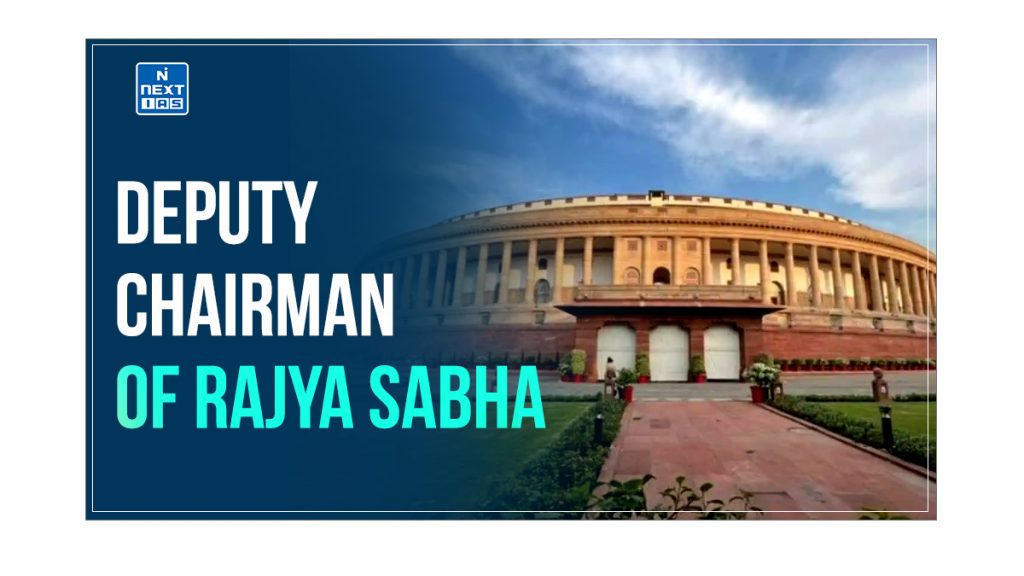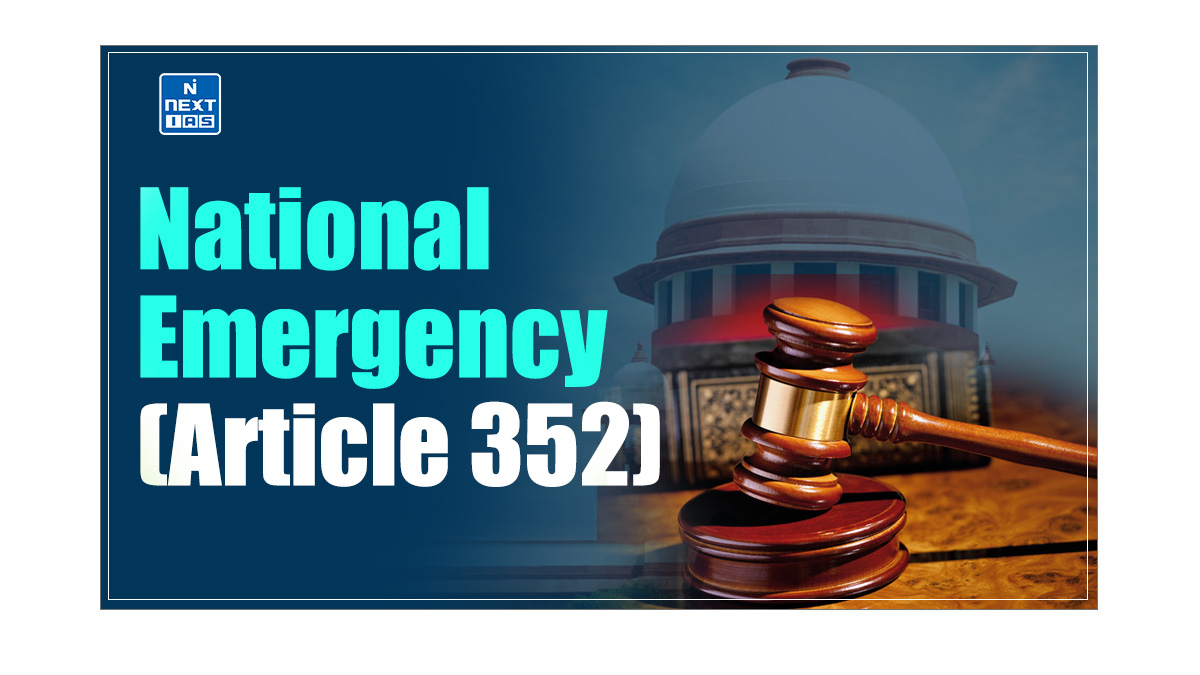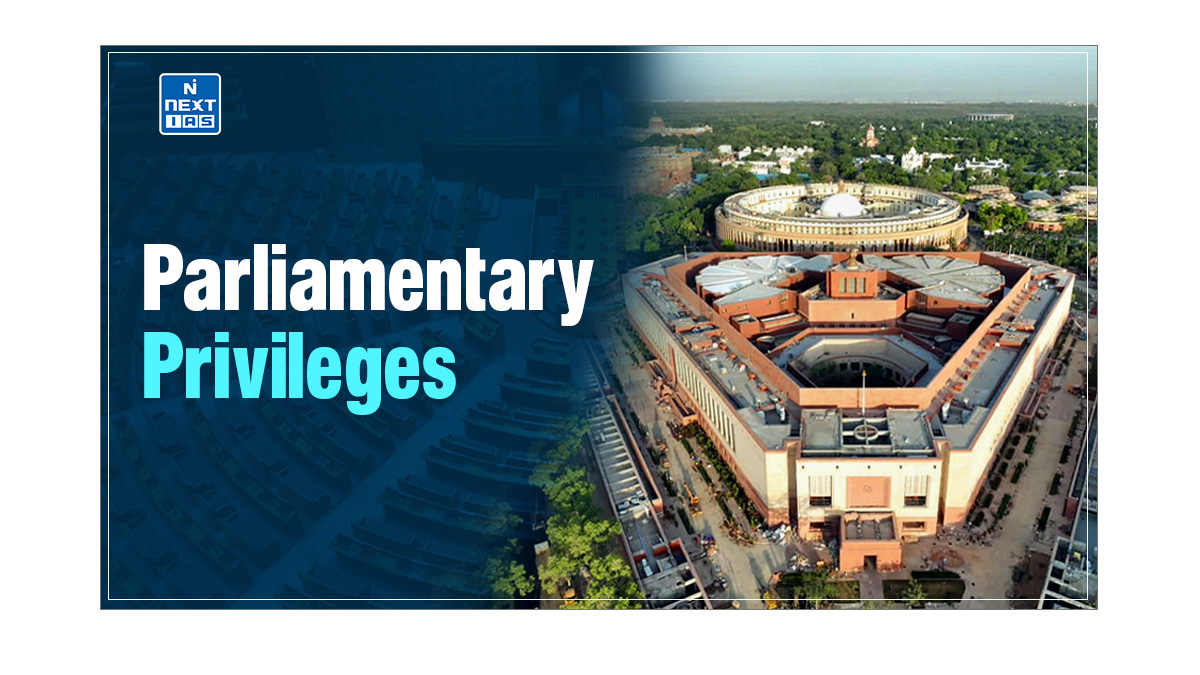
As the Second-in-Command in the House, the Deputy Chairman of Rajya Sabha holds a pivotal role in the Indian parliamentary system. By upholding parliamentary rules and conventions, the Deputy Chairman ensures the smooth functioning of the legislative wing of the Government. This article of NEXT IAS aims to study in detail the Deputy Chairman of Rajya Sabha, including the election procedure, tenure, role, powers, functions, significance, and other related aspects.
About Deputy Chairman of Rajya Sabha
- The Deputy Chairman serves as the Second-in-Command Presiding Officer of the Upper House of Parliament of India—the Rajya Sabha.
- In the absence of the Chairman, the Deputy Chairman assumes the role of the Presiding Officer of the Rajya Sabha and is responsible for maintaining order and decorum in the house, conducting its business, and ensuring that the legislative process is carried out smoothly.
| About Presiding Officers of Parliament – The Presiding Officers of Parliament refer to the officials who oversee and regulate the proceedings of the Houses of Parliament (Lok Sabha and Rajya Sabha in the case of India). – They are responsible for upholding parliamentary rules, maintaining order, managing debates, and conducting the legislative process as per the established procedures within their respective houses of the Parliament. – Overall, their role is to ensure that the legislative body functions smoothly and efficiently. Read our detailed article on Presiding Officers of Indian Parliament. |
Election of Deputy Chairman of Rajya Sabha
- The Deputy Chairman of Rajya Sabha is elected by the Rajya Sabha itself from amongst its members.
- A candidate has to secure a Simple Majority i.e. majority of the members present and voting in order to get elected as the Deputy Chairman of Rajya Sabha.
- The election process is presided over by the Chairman of Rajya Sabha.
Oath and Affirmation of Deputy Chairman of Rajya Sabha
- The Deputy Chairman of Rajya Sabha, while assuming his/her office, does not make and subscribe to any separate oath or affirmation.
- Their oath as a Member of Parliament suffices for his/her role as Deputy Chairman of Rajya Sabha.
Tenure of Deputy Chairman of Rajya Sabha
- Usually, the tenure of the Deputy Chairman is co-terminus with his/her membership of the Rajya Sabha.
- However, he/she has to vacate his/her office earlier in any of the following three cases:
- If he/she ceases to be a member of the Rajya Sabha,
- If he/she resigns by writing to the Chairman,
- If he/she is removed by a resolution passed by a majority of all the then members of the Rajya Sabha (i.e. Effective Majority).
| Note: Whenever the Office of the Deputy Chairman falls vacant, the Rajya Sabha elects another member to fill the vacancy. |
Removal of Deputy Chairman of Rajya Sabha
- The Deputy Chairman of Rajya Sabha can be removed by a resolution passed by the Rajya Sabha by an Effective Majority (i.e. a majority of the total membership of the House excluding the vacant seats).
- A motion of removal of the Deputy Chairman of Rajya Sabha can be moved only after giving 14 days’ advance notice.
- When a resolution for removal of the Deputy Chairman is under consideration of the House, he/she cannot preside over a sitting of the House, though he/she may be present.
Roles and Functions of Deputy Chairman of Rajya Sabha
- The Deputy Chairman performs the duties of the Chairman when:
- the office of the Chairman is vacant,
- the Vice President acts as the President or
- The Vice President discharges the functions of the President.
- The Deputy Chairman acts as the Chairman when the latter is absent from the sitting of the House.
- The Deputy Chairman presides over a joint sitting of both Houses of Parliament in case the Speaker and Deputy Speaker are absent from such a sitting.
| Note: The Chairman of Rajya Sabha cannot preside over the joint sitting of both Houses of Parliament. |
Powers and Privileges of Deputy Chairman of Rajya Sabha
- While performing the duties of or acting as the Chairman of Rajya Sabha (i.e. while presiding over the sitting of Rajya Sabha or a Joint Sitting of both the Houses), he/she assumes all the powers of the Chairman of Rajya Sabha.
- Thus, in such times, the Deputy Chairman cannot vote in the first instance, rather he/she can only exercise a Casting Vote in case of a tie.
- When the Chairman presides over the House, the Deputy Chairman is like any other Ordinary Member of the House.
- Thus, in such times, the Deputy Chairman can speak in the House, participate in its proceedings, and vote in the first instance on any question before the House.
| Note: The Deputy Chairman is not subordinate to the Chairman, but is directly accountable to the Rajya Sabha. |
Salary and Allowances of Deputy Chairman of Rajya Sabha
- The Deputy Chairman of Rajya Sabha is entitled to a regular salary and allowances fixed by the Parliament.
- The salary and allowances of the Deputy Chairman of Rajya Sabha are charged on the Consolidated Fund of India and hence are not subject to the annual vote of Parliament.
Significance of Deputy Chairman of Rajya Sabha
The Deputy Chairman of Rajya Sabha holds significant importance in the Indian parliamentary system as can be seen below.
- Orderly Function of House – In the absence of the Chairman, the Deputy Chairman presides over the sessions of the Rajya Sabha. This includes managing debates, maintaining order, and ensuring that parliamentary procedures are followed.
- Ensuring Continuity – The Deputy Chairman ensures continuity in the functioning of the Rajya Sabha, especially during the absence of the Chairman. This is crucial for maintaining the legislative process without interruptions.
- Committee Oversight – The Deputy Chairman may also be involved in the functioning of various parliamentary committees, which are essential for detailed scrutiny of legislative proposals and government policies.
Conclusion
The Deputy Chairman of Rajya Sabha is a vital component of India’s parliamentary system. By presiding over sessions in the absence of the Chairman, maintaining order, and ensuring the smooth operation of legislative activities, the Deputy Chairman plays a crucial role in the functioning of the Rajya Sabha. Overall, the office of Deputy Chairman of Rajya Sabha is significant for upholding the integrity and efficiency of the legislative framework.
GS - 2





